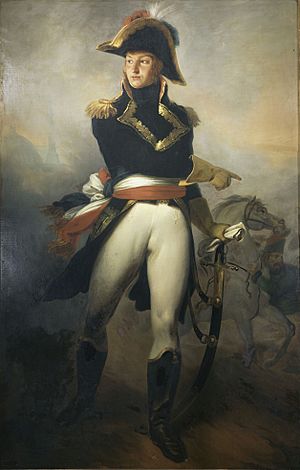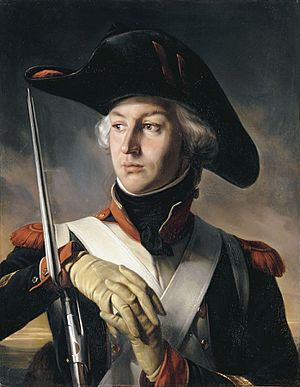Jean-Andoche Junot facts for kids
Quick facts for kids
Jean-Andoche Junot
Duke of Abrantes
|
|
|---|---|

Portrait by Vincent-Nicolas Raverat
|
|
| Military Governor of Paris | |
| In office 1803 – 1804 |
|
| Monarch | Napoleon I |
| Preceded by | Édouard Mortier |
| Succeeded by | Joachim Murat |
| In office 1806 – 1807 |
|
| Preceded by | Joachim Murat |
| Succeeded by | Pierre-Augustin Hulin |
| Personal details | |
| Born | 24 September 1771 Bussy-le-Grand, Burgundy, Kingdom of France |
| Died | 29 July 1813 (aged 42) Montbard, Côte-d'Or, French Empire |
| Nickname | La Tempête (“The Tempest”) |
| Military service | |
| Allegiance | |
| Branch/service | Army |
| Battles/wars | |
Jean-Andoche Junot, the 1st Duke of Abrantes, was a French military officer. He was born on September 24, 1771, and died on July 29, 1813. He played an important role in the French Revolutionary Wars and the Napoleonic Wars. He was also known by the nickname "La Tempête," which means "The Tempest."
Contents
A Young Soldier's Start
Jean-Andoche Junot was born in Bussy-le-Grand, France. His father was a farmer. Jean-Andoche went to school in Châtillon-sur-Seine. He was studying law when the French Revolution began.
He decided to join the army as a volunteer. He was wounded twice and became a sergeant. Junot first met Napoleon Bonaparte in 1793 during the siege of Toulon. He then became Napoleon's secretary, helping him with his work.
Military Campaigns and Challenges
Junot showed great bravery in military campaigns in Italy. However, he got a serious head wound at Lonato. Some people believe this injury changed his personality. They thought it made him more impulsive and less careful in his decisions.
He became a general at the start of the Egyptian campaign. But he was injured in a duel and captured while returning to France. Later, he took part in the coup of 18 Brumaire. This was a big event where Napoleon took power in France.
In 1800, Junot married Laure Martin de Permond. She was a long-time friend of the Bonaparte family. He briefly served as an ambassador to Portugal. After that, he quickly returned to fight under Napoleon at the Battle of Austerlitz in December 1805.
Leading in the Peninsular War
Junot's most important command was during the Peninsular War. He led the French invasion of Portugal in 1807. He left Salamanca in November, hoping to earn a special title and a marshal's baton.
His army successfully took over Lisbon on November 30 without a fight. Because of this achievement, he was given the title Duc d'Abrantès. He also became the Governor of Portugal. However, he did not receive the marshal's baton he wanted.
Things changed when a British army arrived. Junot's forces were defeated at the Battle of Vimeiro on August 21, 1808. He was cut off from France. A special agreement called the Convention of Sintra allowed his army to leave Portugal. They were allowed to take their weapons and belongings. This agreement saved him from being captured.
He returned to France in October. He almost faced a military trial for his actions. In 1810, he went back to the Iberian peninsula. He commanded the VIII Corps under Marshal André Masséna. During this time, he was badly wounded.
Later Years and Legacy
Junot's performance in the Russian campaign was mixed. He was criticized for letting the Russian army escape after the Battle of Smolensk in August 1812. But at the Battle of Borodino in September 1812, he led his 8th Corps well.
Napoleon was very angry with Junot after Smolensk. He decided he would never make Junot a marshal. Some people think Napoleon kept Junot in important roles for a long time, despite his mistakes, because of their old friendship.
In 1813, Junot became the Governor of the Illyrian Provinces. But his mental health became worse. This was partly due to his military setbacks. He was sent back to France to be looked after by his father.
Junot died in July 1813 after a fall.
Family
Jean-Andoche Junot had several children. He had two daughters and three sons. One of his sons, Othello, was born in Egypt. His daughter, Joséphine Junot d'Abrantès, was born in Paris in 1802. His sons, Louis Napoléon Andoche Junot and Andoche Alfred Michel Junot, both inherited the title of Duke of Abrantes.
See also
 In Spanish: Jean-Andoche Junot para niños
In Spanish: Jean-Andoche Junot para niños
 | Dorothy Vaughan |
 | Charles Henry Turner |
 | Hildrus Poindexter |
 | Henry Cecil McBay |


